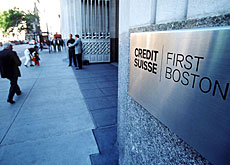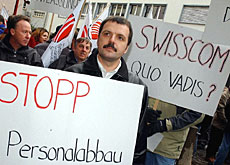UBS boss blames peers for denting trust in markets

Banks and financiers have "severely dented" public trust in global markets through reckless lending, sloppy analysis and profiteering, according to UBS chief Marcel Ospel.
The head of Switzerland’s biggest bank, speaking at the St Gallen Management Symposium, took aim at his peers for undermining investor confidence.
“The image of the financial markets has been unnecessarily tarnished,” said Ospel.
His comments are also being seen as a thinly veiled swipe at UBS rival Credit Suisse.
Although Ospel never named his Zurich-based competitor, he cited several cases of “abuse and manipulation” that have involved the bank and other financial institutions.
His list included “unprofessional research analysts” who fed investment banking clients glowing research reports.
“Some of these reports led investors astray and cost them a lot of money,” commented Ospel.
Credit Suisse has been forced to pay massive fines to United States financial regulators for similar abuses during the 1990s boom years.
Financial manipulators
Ospel also highlighted the favourable allocation of shares during initial public offerings to clients and senior executives of firms involved – another boom-era practice now under investigation.
Earlier this month former Credit Suisse First Boston star Frank Quattrone was charged with obstructing a US federal probe into how the bank handled new stock offerings.
“Today, it’s hardly surprising that so many people don’t trust the financial markets,” said Ospel.
Ospel’s comments are unusual in the normally tight-lipped world of Swiss banks, where senior executives rarely issue public criticism of the industry.
But the UBS chief also defended the global financial system for reining in “short-term excesses”.
“Nobody can claim that the financial markets have not done their job,” he said.
“If the stock markets hadn’t made their ruthless corrections, what other institutions would have been able to force through the appropriate shake-out of company balance sheets so rigorously and so fast,” he added.
33 years in St Gallen
Ospel’s speech was a highlight of day one of this year’s three-day ISC symposium.
Now in its 33rd year, the symposium has drawn more than 600 managers and leaders from 64 countries.
The central theme of this year’s annual symposium, “Seeking responses in times of uncertainty”, echoes the general mood of economic uncertainty afflicting world markets.
Ruth Metzler, the Swiss justice minister, opened the gathering with an appeal for “leadership during difficult times”.
“Leadership means more than just control… it means having the courage to start something new,” she said.
“Because without risk there can be no business, and without business there can be no profit.”
Cutting staff at Swisscom
Participants also heard an address by Jens Alder, the head of Switzerland’s leading telecommunications firm, Swisscom.
Alder used the occasion – which has traditionally been a corporate recruiting ground for new talent – to justify Swisscom’s recent decision to sack thousands of staff.
Alder said the majority state-owned company had little choice to cut costs in the heavily regulated telecommunications market.
With the sector facing falling prices and no prospect for growth, Alder explained that one of his core functions was to lay off staff, a task that had to be handled responsibly.
Alder said Swisscom had offered sacked staff a guaranteed salary for 18 months and was helping them to find new jobs.
No Kofi
Despite a strong turnout, symposium organizers were denied their highest-profile star, United Nations Secretary-General Kofi Annan, who withdrew through illness.
Prominent guests who succeeded in making the journey to St Gallen included South Korean parliamentarian Seung-soo Han, Indian planning commission member, NK Singh and Lord Griffiths of Fforestfach, vice-chairman of Goldman Sachs International.
Lord Griffiths said the global economy was still suffering a hangover, adding that the rift between the US and Europe, as well as reform fatigue, were adding to uncertainty.
The conference concludes on Saturday.
swissinfo, Jacob Greber in St Gallen
The 33rd International Students’ Committee Symposium runs from May 22 to 24.
More than 600 students, politicians and corporate leaders from 64 countries are attending.
The Symposium was started in 1969 by students at the University of St Gallen.
Since then it has developed into a leading management conference.
Key speakers in 2003 include UBS chief Marcel Ospel, Swisscom head Jens Alder.
UN Secretary-General Kofi Annan withdrew because of illness.

In compliance with the JTI standards
More: SWI swissinfo.ch certified by the Journalism Trust Initiative












You can find an overview of ongoing debates with our journalists here . Please join us!
If you want to start a conversation about a topic raised in this article or want to report factual errors, email us at english@swissinfo.ch.